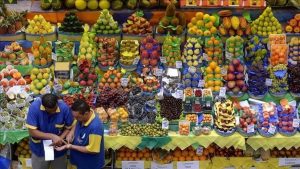World Food Price Index: FAO

According to the UN Food and Agriculture Organization’s (FAO), the World food price index averaged 159.3 points in March, breaking an earlier record of 137.6 points scaled 11 years ago in February 2011.
- The FAO index has exhibited huge volatility in the last two years through the Covid-19 pandemic and now the Russia-Ukraine war.
- The index had crashed to a four-year low of 91.1 points in May 2020, due to demand destruction triggered by pandemic-induced lockdowns across countries.
- But as demand returned with governments lifting economic activity and movement restrictions, supply chain disruptions — from shortages of everything, from harvesting labourers to packaging materials and shipping containers — came to the fore.
- The supply shortages have worsened with the Black Sea region tensions, leading to the index moving up almost 24 points or 17.5% between January and March 2021.
- The FAO’s cereal and vegetable oil price indices hit record highs of 170.1 points and 248.6 points, respectively, in March 2021.
- Port closures in the Black Sea and Azov Sea, plus Russian banks being cut off from the international payments system, have resulted in massive shipping disruptions from this key agri-commodities supply region.
Food Price Index:
- It was introduced in 1996 as a public good to help in monitoring developments in the global agricultural commodity markets.
- The FAO Food Price Index (FFPI) is a measure of the monthly change in international prices of a basket of food commodities.
- It measures changes for a basket of cereals, oilseeds, dairy products, meat and sugar.
- Base Period: 2014-16.
Food and Agriculture Organization:
- FAO is a specialised agency of the United Nations that leads international efforts to defeat hunger.
- World Food Day is celebrated every year around the world on 16th October. The day is celebrated to mark the anniversary of the founding of the FAO in 1945.
- It is one of the UN food aid organisations based in Rome (Italy).
- Its sister bodies are the World Food Programme and the International Fund for Agricultural Development (IFAD).




